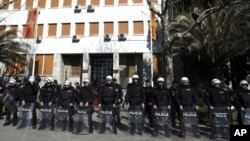Montenegro's parliament voted on Wednesday to strip an opposition leader of immunity, paving the way for the public prosecutor to question him as part of an investigation into an alleged Russian-backed plot to overthrow the government.
On election day last October, authorities arrested 20 people accused of planning armed attacks against state institutions and a foiled plot to assassinate of the former prime minister Milo Djukanovic in order to bring an opposition figure to power.
The special prosecutor said the alleged coup was backed by Russian nationalists.
Forty-two deputies allied with Djukanovic's coalition in the 81-seat parliament voted to strip Andrija Mandic, leader of the opposition Democratic Front, and his ally Milan Knezevic, of immunity upon the request of the special prosecutor.
The 39 opposition lawmakers have boycotted parliament since the election and the arrests.
The opposition says the plot was fabricated and accuses Djukanovic of using the security services to help extend his quarter century of dominance over Montenegro. It rejected the election results, accusing the government of a climate of fear.
With the boycott and the prospect of arrest warrants for the two opposition figures, analysts say the former Yugoslav republic is facing its biggest crisis since independence in 2006, with the possibility of growing demonstrations in protest.
Around 100 opposition supporters gathered in front of the parliament on Wednesday to protest against parliament's vote.
Both, Mandic and Knezevic are outspoken advocates of closer ties with Russia and oppose the country's NATO membership.
Before the vote, Djukanovic said Russia was financing the opposition in order to derail Montenegro's imminent NATO membership. Opposition parties, many also pro-NATO, deny this.
The Adriatic republic of 620,000 people has strong economic and traditional ties with Russia, another predominantly Orthodox Christian country. But relations cooled in recent years especially after Montenegro introduced sanctions against Russia over the conflict in Ukraine, embracing EU policies.





